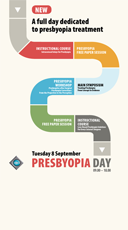Small incision femtosecond refractive lenticle assisted corneal collagen cross-linking (CXL) in corneal ectasia
(results will display both Free Papers & Poster)
Session Details
Session Title: Cross-Linking
Session Date/Time: Sunday 06/09/2015 | 08:00-09:30
Paper Time: 08:45
Venue: Main Auditorium
First Author: : H.Gupta INDIA
Co Author(s): : M. Sachdev D. Gupta G. Sachdev R. Sachdev
Abstract Details
Purpose:
To evaluate epi – off corneal collagen crosslinking (CXL) using refractive stromal lenticule of another patient undergoing small incision femtosecond lenticule extraction in patients having keratectasia with thinnest pachymetry value of less than 400 microns and not treatable using standard de-epithelialization techniques.
Setting:
Centre For Sight, New Delhi, India
Methods:
7 patients with progressive keratectasias with thinnest pachymetry ranging from 360 μm to 397 μm underwent CXL using a modified technique using refractive stromal lenticule from patients undergoing small incision femtosecond lenticule extraction for moderate myopia . Epithelium was debrided and stromal lenticule 6.0 mm in diameter, harvested simultaneously, was placed so that the centre corresponded to the apex of the cone. Riboflavin 0.1 % drops were put and CXL carried out in the standard manner The patients underwent complete ophthalmological examination, including endothelial cell density measurements and computerized videokeratography, before CXL and at one, 6, and 12 months thereafter.
Results:
No intraoperative or postoperative complications were noted. The presence of postoperative stromal haze and its resolution was similar to conventional CXL. A best corrected visual acuity (with contact lens fitting) of 6/9 or more was seen in all cases. Corneal stability was demonstrated on topography at 6 months follow up. Specular microscopy revealed no significant endothelial cell loss. Demarcation line was observed post operatively in all the cases on corneal OCT imaging at a depth ranging from 280 to 310 microns.
Conclusions:
The new technique of using refractive stromal lenticule for CXL increases the corneal thickness in most physiological way. In our series, it was found to be a safe, effective and viable alternative to enhance corneal thickness during CXL in patients with keractectasia having thin or ultrathin corneas.
Financial Interest:
NONE





